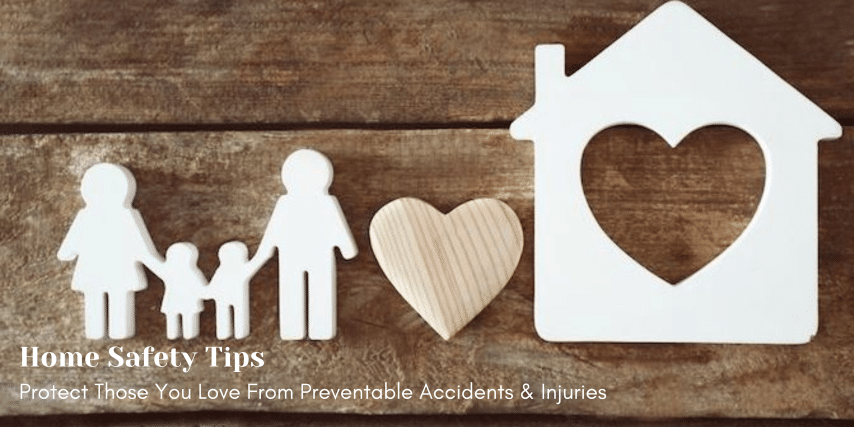
Home safety tips are important to protect you and your family from unintentional accidents and injuries. Every year, there are hundreds of thousands of accidents and injuries with just shy of 20,000/year resulting in fatalities. In fact, unintentional injuries are the 6th leading cause of fatalities of people between the ages of 1-34 with falls being the number one cause followed by poisoning.
That makes home safety tips all that much more important if you ask me.
If you have young children, there are steps that you can take to make sure your home is a safer environment; but even if you don’t have kids, it’s important to be aware of where the potential for accidents or injuries present themselves. Here is a list of possible situations that can impact your safety at home and how to remedy them.

.JPG)
As the population ages, a common cause for concern is people living in homes that no longer match their needs and/or their abilities. The best approach to making homes not only safe, but also comfortable, is to plan ahead and have a home remodeled to meet your needs. This could include step free entryways/doorways, wider hallways, washrooms to accommodate wheelchairs, lowering the height of switches and easy to use lever style doors and handles. Falls rank right up there with one of the top causes of injuries among seniors so these are some relatively easy to incorporate home safety tips that should not be ignored. Another common issue for seniors is not using walkers and canes properly. If unsure about how to use it, seek instruction from a doctor or physiotherapist.
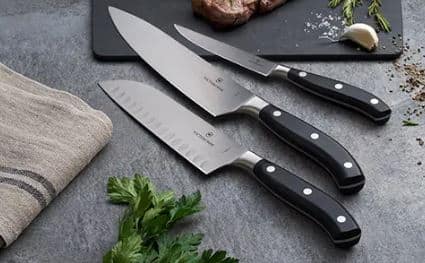
.JPG)
Did you know that the majority of lacerations and punctures actually occur by people using kitchen knives to open hard plastic clam shell packages? To help reduce the risk that this may pose, try using a can opener or even scissors with a blunt tip. Home safety tips can seem so simple but they are so often ignored! Another fun fact – a sharp knife is actually safer than a dull knife because the force used to cut with a dull blade is what often leads to injuries. It also goes without saying that sharp objects should be kept out of reach for little hands as well.
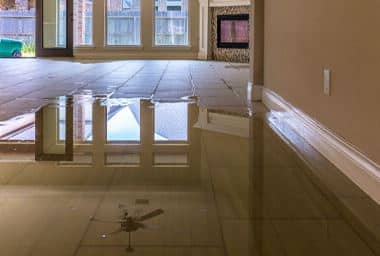
INDOOR AIR QUALITY
If you’ve had a flood in your home, this can lead to indoor air quality issues and in turn, breathing related issues. Microorganisms can penetrate into wet, porous materials and are released into the air later on which can cause illnesses or allergic reactions. Dealing with a flood is a big hassle but home safety tips revolve around cleaning it up properly.
To do so:
– remove all wet items that can’t be cleaned/dried
– open doors/windows/cabinets/closets
– turn on fans throughout
– don’t use an air conditioner
– clean out all air ducts
– if damage is extensive, call in the professionals

.JPG)
When water comes to mind, you’re probably expecting home safety tips related to drowning and while yes, this is a big one when it comes to prevention, another big risk associated with water is actually electrocution. This can arise due to faulty underwater lighting, aging wires, sump pumps, power washers and even ungrounded vacuums. In addition, electrical appliances and/or cords that can fall into the water. The best way to protect yourself and your family is with regular inspection, detection and correction of any hazards. Smart home safety tips also include upgrading lights, receptables and switches with Ground Fault Circuit Interrupters (GFCI’s). Older pools tend to be more concerning than modern, newly built pools.
In addition, did you know that the suction from a pool or spa drain can actually be so powerful that it can hold an adult underwater and lead to a fatality? To avoid such a tragedy, owners should consider installing a safety vacuum release system. This will detect a blocked drain and automatically shut off the pool pump or interrupt circulation to avoid / prevent entrapment. Drain covers should always be in place.
If you have a pool or hot tub, take any and all necessary precautions to prevent any of the above noted home safety issues along with all of the regular ones such as fencing off a pool, securing hot tub covers down etc. Prevention is the key.
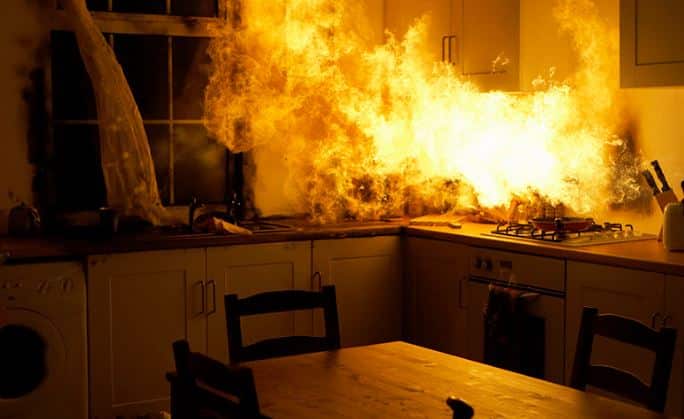
.JPG)
Were you aware that the fatalities that result from fires tend to be highest among people over the age of 65 and with children under the age of 5? Fires/burns in the home are the third leading cause of unintentional home injury deaths and ninth leading cause of injuries that require a visit to the ER. In terms of home safety tips, prevention is key with the use of smoke detectors that are regularly maintained and have fresh batteries. It also helps to have a clearly defined fire escape route.
Another common cause of fires is related to the careless use and faulty maintenance of dryers and their exhaust vents. Fires can often occur if lint builds up in the dryer or exhaust duct. Blocked air can lead to an excessive heat build up and catch fire. Make sure you’re vigilant cleaning your lint trap with every load of laundry. It’s also a great home safety tip to get the dryer vent cleaned yearly by a professional appliance repair person or chimney sweep.
Fire safety doesn’t end inside your home; other fire risks often center around using BBQ’s. Never use a grill inside a garage, on a porch or under a surface that can catch fire.
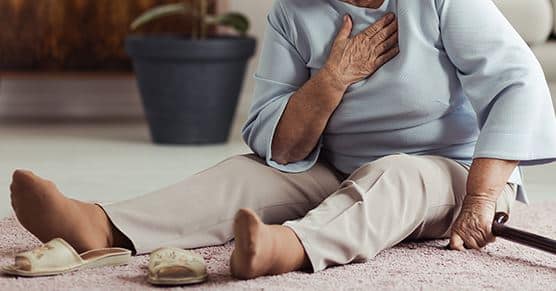
SLIPS & FALLS
Literally tens of thousands of people fall inside or immediately outside their home each year due to a pet! Pets generally like to be close by and under feet but there are some things you can due to reduce the possibility of an injury related to one such as training, no pets in the kitchen, using gates to block off areas in the home and keeping cages/water and food bowls out of the way where you walk.
When it comes to regular slip and fall incidents that don’t involve a pet, home safety tips include:
– wearing grippy, supportive footwear that fits properly.
– fixing any potential hazards such as uneven walkways/stairs, freeing hallways of any clutter, keeping cords out of the way
– implementing regular exercise can help a lot when it comes to balance, coordination and strength.
– take inventory of any medications you’re taking as some can create issues of this nature. In fact, starting, stopping or changing medications can actually create some of the worst problems with slips and falls.
– get your eyes checked at least once a year!
Be extra vigilant in the washroom which is where a majority of slips and falls tend to take place. It could be a good idea to consider a bar in your shower or near toilets to give you some stability along with a bench inside your shower/tub, using no slip mats, using a motion sensored nightlight and wiping up any water when you see it.
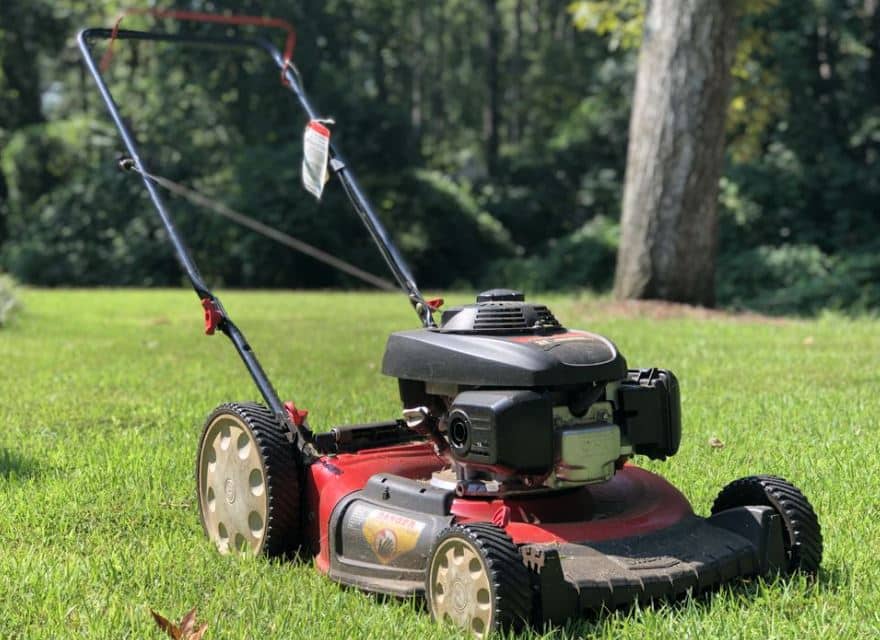
LAWNMOWERS
My brother died in an accident with a riding lawnmower when he was just ten years old. In this particular instance, he was not only left home alone, the location where the tractor was kept was unlocked and the key was left in its ignition. Since it was situated at the top of a hill, the fatal incident ensued because my brother pulled the tractor out the wrong way, causing it to tip over and roll down the hill, ultimately landing on top of him. This was completely devastating for my family and what was also upsetting was how many things that lead to the accident that were completely preventable.
While this is an extreme situation, and it may not be common to die from a lawnmower, there are still tens of thousands of accidents caused using them each year – often caused by flying projectile objects or foot fractures.
Home safety tips to follow while using a lawnmower are important and can include:
– wearing goggles, long pants, protective gloves and close toed shoes
– clearing any debris before you start cutting the grass
– keep children and pets inside while you’re working
– never try to inspect or service a mower while it’s on/running
– avoid cutting the grass when it’s raining or in high heat
– do not carry passengers on riding mowers
– store lawn mowers in a secure area with minimal traffic and where it’s not accessible to children
– do not using riding mowers on any steep hills or embankments
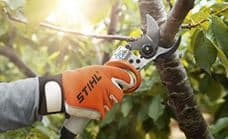
TOOLS
You may assume that the majority of injuries related to tools would be from powerful power tools, but you’d be wrong. There are a higher number of accidents and injuries sustained using hand tools and utility knives than with power saws/drills. The most common of all is striking a finger or hand with a hammer. Paying close attention can help prevent these kinds of injuries.
Other home safety tips when it comes to tools are not overstretching bungee cords. If they snap, they can cause blindness. In addition, pressure washers are also a culprit of thousands of injuries, not only from the pressure but how it’s being used (i.e. falling off a ladder while using it, slipping on water around it, operating it within the home or a garage etc.)
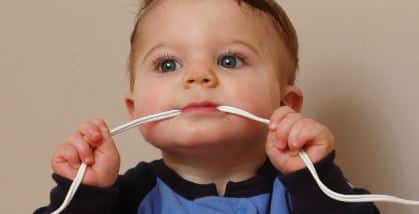
ELECTRICAL SAFETY
As noted above, electrical safety around the water is important but what about general home safety tips? You may be surprised to learn that burns to the mouth actually account for more than half of the injuries related to using extension cords. If they are not safety secured/tucked away, children and pets can and will chew on extension cords that are accessible to them. This can lead to serious burns and even electrocution. Buying cords with a UL or OSHA label can help along with inspecting cords for wear/tear (cracking, fraying etc.), not overloading them and trying to avoid them unless absolutely necessary.
Other sources of electrical safety are with older electrical tools, namely those made before 1980. This is because they were made with metal housings while newer tools use plastic with double insulation to provide protection from electrical shocks. Older models may also not be grounded properly or have damaged wires.

POISONOUS SUBSTANCES
When it comes to home safety tips, it goes without saying that any poisonous substances should be in locked cabinets or those that are out of reach for pets and children (i.e. medications, cleaning agents, laundry soap/pods etc.). In addition, there are also lots of popular flowers/plants that are poisonous to humans and pets. Some of the most common are lilies, oleander, tulip bulbs, chrystanthemums and rhododendrons.
Home safety tips vary and you can’t live in a bubble – but there are lots of common sense things you can do to keep yourself and your loved ones safe. I hope you’ve found these tips to be helpful!
You may also enjoy these articles, “Tools Every Home Owner Needs” and “How To Babyproof a Home”.
If you’re looking to buy, sell or invest, let’s chat! I can be reached at 647-896-6584, by email at info@serenaholmesrealtor.com or by filling out this simple contact form.
And, for plenty of other great content with tips, news and more, make sure we’re connected on social @serenaholmesrealtor and you’re subscribed to my YouTube channel.
Some content credited to: https://www.aarp.org/home-garden/housing/info-06-2010/30_safety_tips.html










